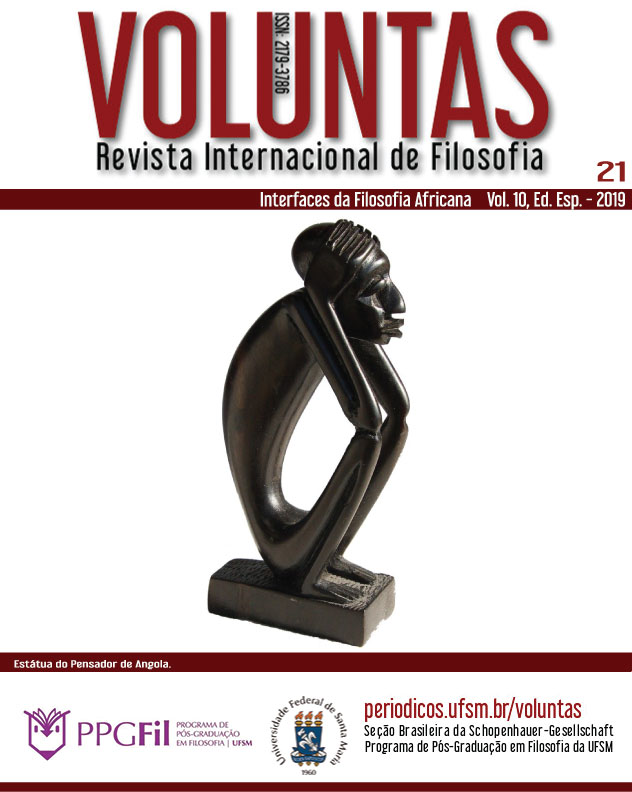Language problems in African philosophy
DOI:
https://doi.org/10.5902/2179378639955Keywords:
Language, African philosophy, Essentialist, Non-essentialistAbstract
The African philosophical community has an interesting, fruitful and important debate on language. On the one hand, there are the essentialist philosophers whose main thesis is the use of native languages for teaching and philosophical practice. On the other hand, there are non-essentialist philosophers who do not oppose the use of foreign languages for teaching and philosophical practice. In this article, I present the main points of this debate from the frame projected by Fayemi and argue that the political-ideological thesis of the essentialists does not imply the metaphysical thesis of impossibility to express certain aspects of reality.
Downloads
References
AFOLAYAN, A. The language question in African Philosophy. In: OLADIPO. Olusegun. Core issues in african philosophy. Ibadan: Hope Publications, 2006.
APPIAH, A. Na casa de meu pai: a África na filosofia da cultura. Trad. Vera Ribeiro. Rio de Janeiro: Contraponto, 2010.
AZENABOR, G. Understanding the problems in African philosophy. Lagos: First Academic Publishers, 2004.
BEDU-ADDO, J. T. On the Concept of Truth in Akan. In: BODUNRIN, P. O. (ed.). Philosophy in Africa: trends and perspectives. Ife: University of Ife Press, 1985.
BELLO, A. G. A. Philosophy and an African language. Quest. v. 1, n 1, 1987.
BEWAJI. African languages and critical discourse. In: OLADIPO, Olusegun (ed.). The third way in African philosophy: essays in honour of Kwasi Wiredu. Ibadan: Hope Publications, 2002.
FAYEMI, A. K. The problem of language in contemporary African philosophy: some comments. Inkanyiso Journal of Human and Social Science. v. 5, n. 1, 2013.
GYEKYE. An essay on African philosophical thought: the Akan conceptual scheme. Philadelphia: Temple University Press, 1995.
HALLEN, B; SODIPO, J. O. Knowledge, belief, and witchcraft: analytic experiments in African philosophy. Stanford: Stanford University Press, 1986.
KEITA, L. Africa and its linguistic problematic. Quest. v. 13, n 1-2, p. 27-35, 1999.
MAKINDE, M. A. African philosophy, culture and traditional medicine. Ohio: Ohio University Centre for International Studies, 1988.
OGUNMODEDE, F. African philosophy in African language. Proceedings of the international conference on African philosophy and feministic studies. Lagos, 1993.
PINTO, J. P. Ideologias linguísticas e a instituição de hierarquias sociais. Revista da ABPN – Caderno Temático: letramentos e reexistência. v.10, p. 704-720, 1992.
TANGWA, G. Colonial legacy and the language situation in Cameroon. Quest. v. 6, n 2, 1992.
UROH, C. Colonialism and the language question: a reply to Godfrey Tangwa. Quest. v. 08, n 2, 1994.
WA THIONG’O, N. Decolonizing the mind: the politics of language in African literature. London: James Currey, 1986.
WIREDU, K. The Akan concept of mind. Ibadan Journal of Humanistic Studies. n 3, p. 113-134, 1983.
WIREDU, K. Philosophy and African Culture. Cambridge: Cambridge University Press, 1980.
WIREDU, K. The concept of truth in Akan language. In: BODUNRIN, P. O. Philosophy in Africa: trends and perspectives. Ife: University of Ife Press, 1985.
WITTGENSTEIN, L. Tractatus Logico-Philosophicus. Trad. Luiz Henrique Lopes dos Santos. São Paulo: EDUSP, 1993.
Published
How to Cite
Issue
Section
License
The submission of original manuscripts to this journal implies the transference, by the authors, of the copyrights for printed and digital publication. The copyrights of a published manuscript belong ultimately to the author, and only the copyright for its first publication is reserved to the journal. Authors may only use the same results in other publications explicitly indicating this journal as the medium of the original publication.
Licence
Attribution-NonCommercial-ShareAlike 4.0 International (CC BY-NC-SA 4.0) - This license lets others remix, tweak, and build upon your work non-commercially, as long as they credit you and license their new creations under the identical terms.






